You'll find relief from bloating with a soothing fennel blend tea that's easy to make at home. Fennel seeds contain compounds that relax your digestive tract muscles, reducing gas and bloating. To prepare, crush 1-2 teaspoons of fennel seeds and steep them in hot water for 5-10 minutes. For enhanced benefits, consider adding peppermint leaves, ginger root, or chamomile flowers to your blend. Drink 2-3 cups daily, preferably between meals, to maximize its effectiveness. Start with one cup and gradually increase based on your body's response. By mastering the art of brewing this aromatic blend, you'll discover a natural remedy for digestive discomfort.
Key Takeaways
- Crush 1-2 teaspoons of fennel seeds and steep in hot water for 5-10 minutes to create a bloating relief tea.
- Combine fennel seeds with peppermint leaves, ginger root, and chamomile flowers for enhanced digestive benefits.
- Drink 2-3 cups of fennel tea daily, preferably between meals, to alleviate bloating and promote smoother digestion.
- Maintain water temperature around 200°F (93°C) for optimal extraction of fennel's therapeutic compounds.
- Strain the tea thoroughly to ensure a clear infusion and maximize the release of beneficial oils and properties.
Benefits of Fennel Seeds
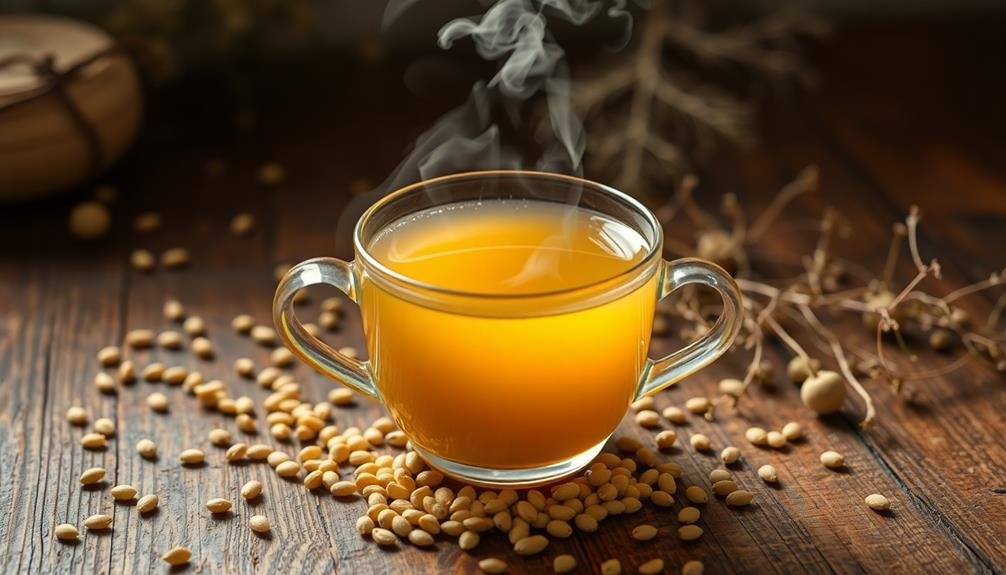
Soothing your digestive system, fennel seeds offer a range of benefits for bloating relief. These tiny powerhouses contain compounds that help relax the muscles in your digestive tract, reducing gas and bloating. You'll find that fennel seeds can alleviate stomach cramps and promote smoother digestion overall.
Rich in antioxidants, fennel seeds also combat inflammation in your gut, which can contribute to bloating. They're particularly effective at reducing water retention, helping you feel less puffy and more comfortable. You'll appreciate their natural diuretic properties, which can help flush out excess fluids from your body.
Fennel seeds are known to stimulate the production of gastric juices, enhancing your body's ability to break down food efficiently. This improved digestion means less chance of undigested food fermenting in your intestines and causing bloat.
You'll also benefit from fennel's antimicrobial properties, which can help balance your gut flora and reduce harmful bacteria that may lead to digestive discomfort.
Essential Ingredients for the Blend
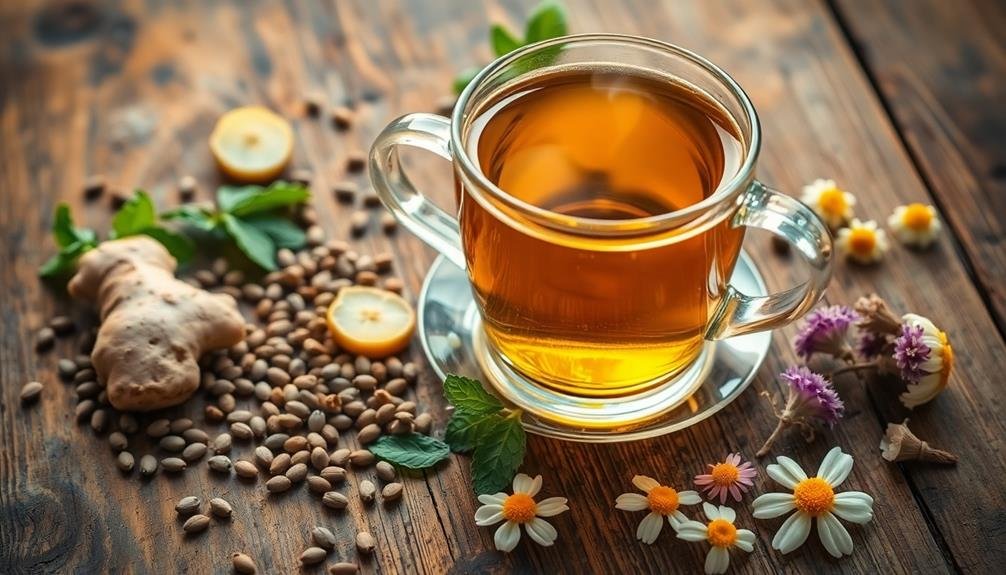
To create an effective bloating relief tea, you'll need to gather key herbs and spices known for their digestive benefits.
Start with fennel seeds, peppermint leaves, and ginger root as your base ingredients.
You can enhance the blend's potency by adding chamomile flowers, lemon balm, or caraway seeds, which offer additional soothing properties for your digestive system.
[DIRECTIONS]:
Key Herbs and Spices
Creating an effective DIY tea blend for bloating relief hinges on selecting the right combination of herbs and spices. Fennel seeds are the star ingredient, known for their ability to reduce gas and ease digestive discomfort.
You'll want to include peppermint leaves, which can help relax the muscles of your gastrointestinal tract and alleviate bloating. Ginger root is another essential component, offering anti-inflammatory properties and promoting healthy digestion.
Don't forget to add chamomile flowers, which can soothe your stomach and reduce inflammation. Caraway seeds are excellent for combating gas and bloating, while also adding a pleasant flavor to your blend.
Consider incorporating lemon balm leaves for their calming effect on the digestive system. Ultimately, a pinch of cinnamon can help improve overall digestion and add a warm, comforting taste to your tea.
When combining these herbs and spices, aim for a balanced mixture that appeals to your taste preferences. You can adjust the ratios to create a blend that's both effective and enjoyable.
Additional Beneficial Ingredients
While the core herbs and spices form the foundation of your bloating relief tea, you can enhance its effectiveness by incorporating additional beneficial ingredients.
Consider adding ginger root to your blend, as it's known for its anti-inflammatory properties and ability to soothe the digestive system. You'll find that ginger also adds a pleasant warmth and spiciness to your tea.
Another valuable addition is peppermint leaves. They're renowned for their ability to relax the muscles of the gastrointestinal tract, potentially alleviating bloating and gas. Peppermint also provides a revitalizing flavor that complements the other ingredients.
Don't overlook the power of chamomile flowers. They're not only calming but can also help reduce inflammation in the digestive tract. Chamomile's mild, apple-like flavor will add a subtle sweetness to your blend.
Lastly, consider including lemon balm leaves. They're known to have carminative properties, which means they can help prevent and relieve gas. Lemon balm also contributes a light, citrusy note to your tea, making it more enjoyable to drink.
Preparing Your Fennel Tea
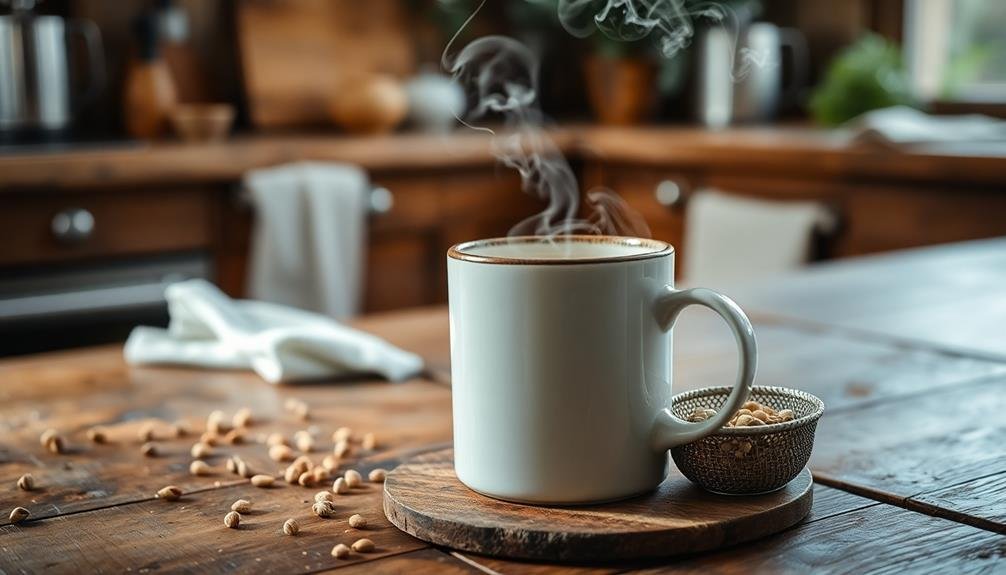
Preparing fennel tea is a straightforward process that'll take just a few minutes of your time.
Begin by crushing 1-2 teaspoons of fennel seeds using a mortar and pestle or the back of a spoon. This releases the seeds' essential oils, enhancing the tea's flavor and therapeutic properties.
Boil water in a kettle or pot. Once boiling, remove it from heat and let it cool for about 30 seconds.
Pour the hot water over the crushed fennel seeds in a cup or teapot. If you're using a teapot, you can add the seeds directly to the pot. Allow the tea to steep for 5-10 minutes, depending on your desired strength.
Strain the tea into your cup if you haven't used a tea infuser. You can sweeten it with honey if you like, though many people enjoy the natural licorice-like flavor of fennel on its own.
For added benefits, consider including some of the additional ingredients mentioned earlier, such as ginger or peppermint.
Sip your tea slowly, allowing its warmth and soothing properties to ease your bloating discomfort.
Proper Brewing Techniques
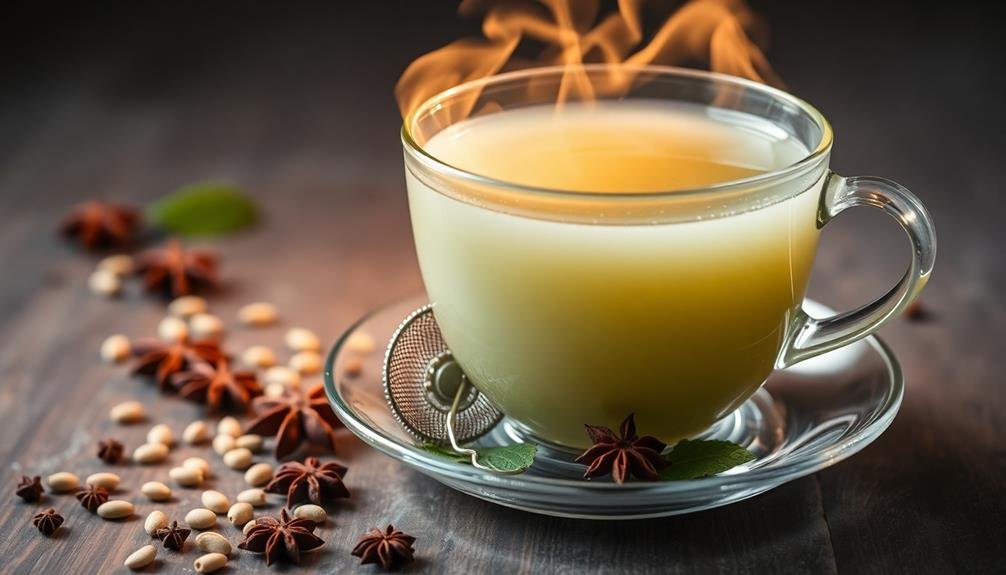
To brew the perfect fennel tea for bloating relief, you'll want to pay attention to a few key factors.
First, make sure your water is at the ideal temperature, typically just below boiling.
Next, be mindful of your steeping time, as letting the tea steep too long can result in a bitter taste.
Optimal Water Temperature
The perfect cup of bloating relief tea starts with the right water temperature. For fennel-based teas, you'll want to aim for water that's around 200°F (93°C). This temperature allows for ideal extraction of the beneficial compounds without scorching the delicate herbs.
If you don't have a thermometer, bring your water to a boil and then let it sit for about 30 seconds before pouring it over your tea blend. This brief cooling period will give you the perfect temperature range.
Be careful not to use water that's too hot, as it can lead to a bitter taste and potentially destroy some of the tea's beneficial properties. On the other hand, water that's too cool won't extract enough of the herbs' flavors and medicinal compounds.
For convenience, you can invest in an electric kettle with temperature control settings. This will guarantee consistent results every time you brew your bloating relief tea.
Steeping Time Matters
Now that you've got the right water temperature, it's time to focus on steeping time. Proper steeping guarantees you extract the best flavor and beneficial compounds from your fennel tea blend. Steeping too long can result in a bitter taste, while under-steeping may not release enough of the tea's therapeutic properties.
For your DIY bloating relief tea, follow these steeping guidelines:
| Ingredient | Steep Time | Water Temperature |
|---|---|---|
| Fennel Seeds | 5-7 minutes | 200°F (93°C) |
| Peppermint | 3-5 minutes | 205°F (96°C) |
| Ginger Root | 5-7 minutes | 212°F (100°C) |
Start by steeping the fennel seeds and ginger root together for 5 minutes. Then, add the peppermint leaves and continue steeping for an additional 2 minutes. This staggered approach allows each ingredient to release its flavors and benefits without overpowering the others.
Straining for Clarity
Straining your bloating relief tea is a crucial step that shouldn't be overlooked. Proper straining guarantees a smooth, debris-free beverage that's not only more enjoyable to drink but also more effective in soothing your digestive discomfort.
To strain your tea effectively, you'll need a fine-mesh strainer or a dedicated tea infuser. Place your strainer over your cup or teapot and slowly pour the steeped tea through it. This will catch any loose herbs, seeds, or particles that may have escaped during the steeping process. If you're using a tea infuser, simply remove it from your cup and discard the used herbs.
For an extra-smooth texture, you can double-strain your tea by passing it through the strainer twice. This is particularly useful if you've used finely ground herbs or powders in your blend. Be sure to gently tap the sides of the strainer to release any trapped liquid, maximizing the yield of your therapeutic brew.
After straining, your tea should appear clear and free from floating particles. This clarity not only enhances the visual appeal but also guarantees that you're consuming a pure, potent infusion tailored for bloating relief.
Dosage and Consumption Guidelines
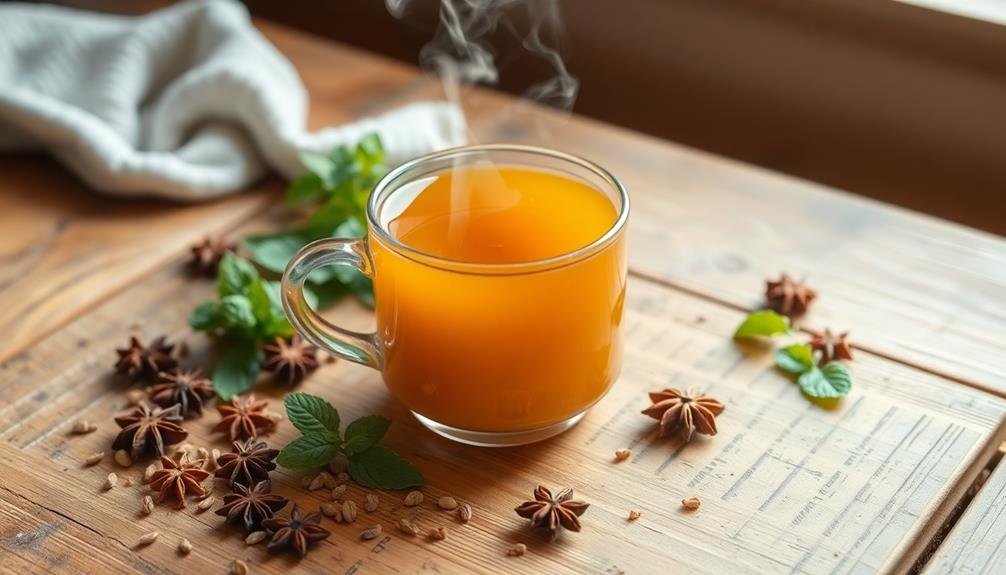
Proper tea-drinking habits are essential for maximizing the bloating relief benefits of your DIY concoction. For ideal results, steep one tablespoon of your fennel blend in 8 ounces of hot water for 5-10 minutes. Drink this tea 2-3 times daily, preferably between meals. You can consume it warm or at room temperature, but avoid adding sweeteners as they may counteract the tea's digestive benefits.
Start with a single cup per day and gradually increase to assess your body's response. If you're pregnant, nursing, or have any medical conditions, consult your healthcare provider before incorporating this tea into your routine. While fennel tea is generally safe, excessive consumption may lead to side effects like nausea or skin reactions in some individuals.
For best results, drink your tea slowly and mindfully. This allows your body to absorb the beneficial compounds and promotes relaxation, which can further aid digestion.
Additional Herbal Enhancers
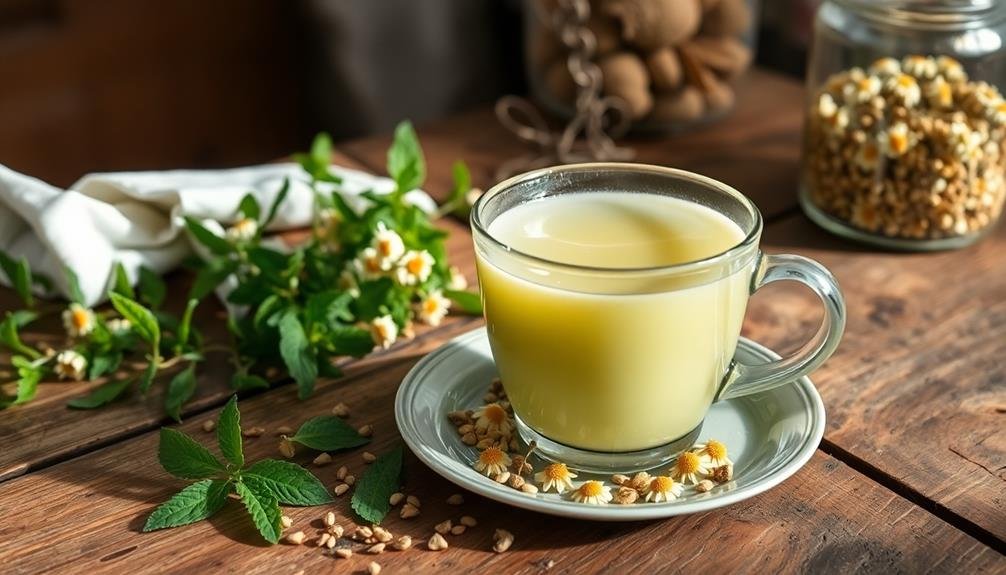
While fennel forms the base of our bloating relief tea, you can enhance its effectiveness by incorporating additional herbs. These complementary ingredients can boost the tea's digestive benefits and add new flavors to your blend.
Consider experimenting with these herbal enhancers:
- Peppermint: Known for its cooling effect, peppermint can help relax the digestive tract and reduce gas.
- Ginger: This warming herb aids digestion, reduces inflammation, and can help alleviate nausea.
- Chamomile: With its calming properties, chamomile can soothe an upset stomach and reduce bloating.
- Lemon balm: This citrusy herb supports digestion and can help reduce stress-related digestive issues.
To incorporate these enhancers, add a small amount (about 1/4 teaspoon) of your chosen herb to your fennel tea blend. You can mix and match to create a personalized combination that suits your taste and needs.
Remember to start with small quantities and adjust as needed. If you're pregnant, nursing, or have any health concerns, consult your healthcare provider before adding new herbs to your diet.
Frequently Asked Questions
Can Pregnant Women Safely Consume Fennel Tea?
You should consult your doctor before drinking fennel tea during pregnancy. While it's generally considered safe in moderation, excessive consumption may cause uterine contractions. It's best to err on the side of caution and seek professional advice.
How Long Does Homemade Fennel Tea Blend Stay Fresh?
You'll find that your homemade fennel tea blend stays fresh for about 6-12 months when stored properly. Keep it in an airtight container, away from light and moisture. For the best flavor, use it within 3-6 months.
Are There Any Potential Side Effects of Drinking Fennel Tea Regularly?
You should be aware that drinking fennel tea regularly can have potential side effects. It may cause allergic reactions, interact with certain medications, or increase estrogen levels. If you're pregnant or have hormone-sensitive conditions, consult your doctor before consuming it frequently.
Can Fennel Tea Be Consumed Cold or Iced?
Yes, you can enjoy fennel tea cold or iced. It's invigorating and maintains its health benefits when chilled. You'll find it's a tasty alternative to hot tea, especially during warm weather. Just brew, cool, and serve over ice.
Is Fennel Tea Suitable for Children With Stomach Discomfort?
Yes, fennel tea can be suitable for children with stomach discomfort. It's generally safe, but you'll want to consult your pediatrician first. Start with a weak brew and monitor your child's reaction. Don't give it to infants.
In Summary
You've now got all the tools to create your own soothing fennel blend for bloating relief. By incorporating this DIY tea into your routine, you'll reap the benefits of fennel seeds and other complementary herbs. Remember to follow proper brewing techniques and stick to recommended dosages. Don't hesitate to experiment with additional herbal enhancers to find your perfect blend. With consistent use, you'll likely notice improved digestive comfort and reduced bloating.

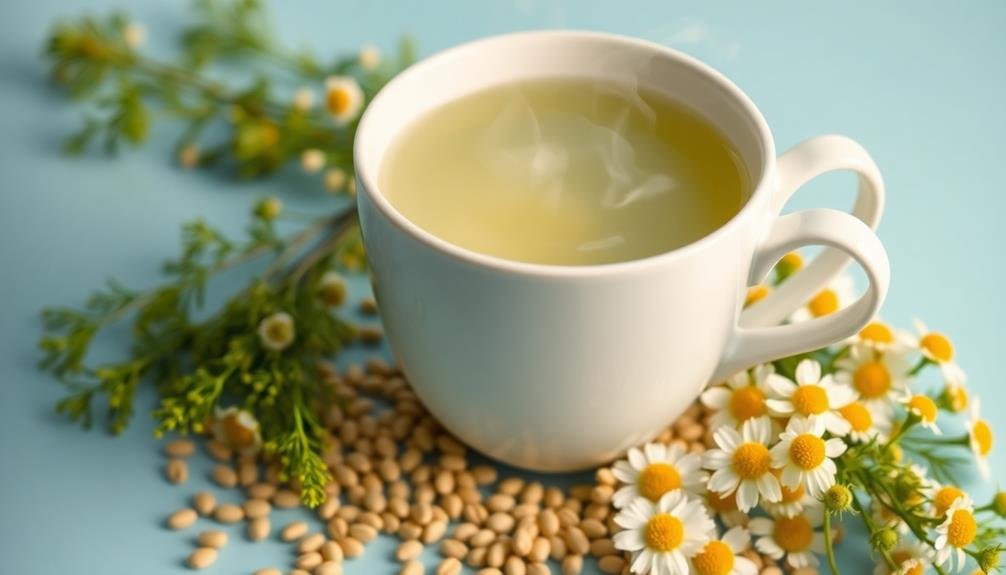


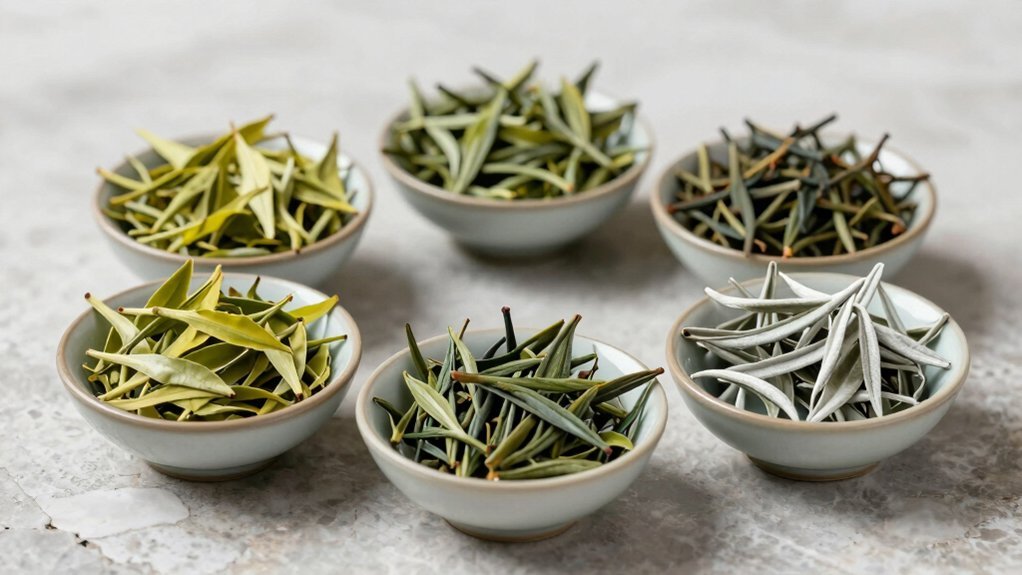
Leave a Reply